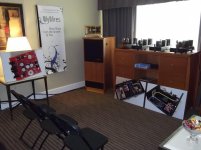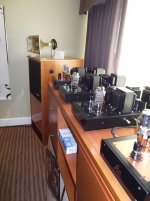Sorry, I'm just catching up with this product so forgive my naive questions. This i staken from the T4 product page:
"It also have an PWM digital input which means it could be connected to digital out of the DDX amplifier for example or another amp with PWM output."
And
"*2nd PWM signal input."
"It also have an PWM digital input which means it could be connected to digital out of the DDX amplifier for example or another amp with PWM output."
And
"*2nd PWM signal input."
Theorically it's all right...that chip has another PWM input...but if you look at the board ...Personally I can't see any PWM input (ther's only 4pin analog and shut-down service signal).
It's an interesting question to be done to Hifimediy; try to ask them.;-) Steiner is very kind and will answer you soon.
It's an interesting question to be done to Hifimediy; try to ask them.;-) Steiner is very kind and will answer you soon.
bank of 10 hole solder pads just below
On other amps there are similar pads. To connect = nowhere. They must have other functions than to connect anything.
@WHALEMAN: Please give us your latest update with the board!
Thank you all
On other amps there are similar pads. To connect = nowhere. They must have other functions than to connect anything.
@WHALEMAN: Please give us your latest update with the board!
Thank you all
Sorry, been busy with the Capital Audiofest show at our nation's capital area (pics). The T4 is breaking in quite nicely, wow, hifimediy really outdid himself, this amp is really true audiophile grade. I am listening to it now with some vintage HH Scott speakers, amazing!
It is still in Frankenstein dress, I am planning the rest of the parts.
Attachments
how you solved the charging issue ?Which is why I use mine with LiFePo4 batteries
So, based on experience, I would vote for multiple individual supplies with WAAY excessive current capabilities.
Which is why I use mine with LiFePo4 batteries with peak current capabilities which approach the theoretically ridiculous, and yet deliver clearly audible performance improvements.
.
So these batteries are even quickier than good big capacitors? Isn't possible to use them in this way, with a proper charger?
So these batteries are even quickier than good big capacitors? Isn't possible to use them in this way, with a proper charger?
I am primary interested in a battery solution for a TA2020 because the benefits of battery supply appeared to me in this case very clear.
Here is a more audiophile fanatics review of a battery supply unit from the manufacturer of kingrex amps (also TA2020 chip)
6moons audio reviews: KingRex SLAP
Not sure if you can listen out the differences clearly between a good PSU and a battery supply in case of T4, T2.
I trust Jack's view about the LiFePO4 batteries as I have some experience of using these in digital audio. They really do sound better than a lot of DIY & commercial regulated PS designs.
There is obviously a higher current requirement here but the A123 batteries I use put out 120Amp instant current for 20 secs & 70Amp continuous & yes they are 8mOhm internal impedance & probably very low noise.
There is obviously a higher current requirement here but the A123 batteries I use put out 120Amp instant current for 20 secs & 70Amp continuous & yes they are 8mOhm internal impedance & probably very low noise.
I've read that review with pleasure: thank you very much TheDealer! It explains without putting a magic-atmosphere  (I hate this behaviour) and reporting facts honestly: the battery acts like a BIIIIG capacity with extralarge current capabilty.
(I hate this behaviour) and reporting facts honestly: the battery acts like a BIIIIG capacity with extralarge current capabilty.
I think that T4 suffers less no-battery issues because it uses an higher rail voltage= less current (at normal listening levels). However batteries are with no doubt an improvement over any SMPS or linear PSU.
Could be interesting such and experiment on a TA2020...but that SLAP is waaaay too expensive!
About me, at the moment I'm very happy with my Meanwell+T4 (total capacity should be around 13000uF+IC regulators and rectifier on T4 board...should be enough for a "normal" use!), even if Meanwell seems(on paper) to be a bit undersized.
I would like to try a different PSU but I'm a uni student..I cannot afford it at the moment.
I like that kind of articles!
 (I hate this behaviour) and reporting facts honestly: the battery acts like a BIIIIG capacity with extralarge current capabilty.
(I hate this behaviour) and reporting facts honestly: the battery acts like a BIIIIG capacity with extralarge current capabilty.I think that T4 suffers less no-battery issues because it uses an higher rail voltage= less current (at normal listening levels). However batteries are with no doubt an improvement over any SMPS or linear PSU.
Could be interesting such and experiment on a TA2020...but that SLAP is waaaay too expensive!
About me, at the moment I'm very happy with my Meanwell+T4 (total capacity should be around 13000uF+IC regulators and rectifier on T4 board...should be enough for a "normal" use!), even if Meanwell seems(on paper) to be a bit undersized.
I would like to try a different PSU but I'm a uni student..I cannot afford it at the moment.
I like that kind of articles!

Last edited:
Yeah, a real good high end audio torroid at 450VA for the T4 is at about $150.
I think a torroid should be much better than a Meanwell.
The voltage is higher and there is no switching.
13,000uF is not that much for an enthusiast.
But it is enough for you if you can enjoy your music. And you can upgrade whenever you want.
If investing very much money on a T-amp, it should be considered to go for a tube amp.
I think a torroid should be much better than a Meanwell.
The voltage is higher and there is no switching.
13,000uF is not that much for an enthusiast.
But it is enough for you if you can enjoy your music. And you can upgrade whenever you want.
If investing very much money on a T-amp, it should be considered to go for a tube amp.
The voltage is higher and there is no switching.
13,000uF is not that much for an enthusiast.
But it is enough for you if you can enjoy your music. And you can upgrade whenever you want.
Meanwell can reach max voltage T4 can support...perhaps wattage is higher and this could make a difference. I know that 13,000uF are not that much...but enough for a minimum level of hi fi, and even something more. Consider that there are also regulators.
Why are you against SMPS? I think that in a SMPS there are no more unwanted harmonics than in a linear PSU...and in my opinion these are all well controlled by regulators...so there isn't any difference between SMPS and linear PS on the quality side (I personally believe that a well engeneered SMPS could also be better than any linear PS, because different approach). In audio what makes the difference is power and instant current capability. All these thoughts are IMHO of course. If you want something really better perhaps you would have to go with a set of LiFePo batteries.
Meanwell can reach max voltage T4 can support
I doubt, that this is true. Meanwell S-350 48V is recommended by Hifimediy.
Maximum single voltage of the board is DC 54V.
With AC, there are 40V-0V-40V allowed. This is 80V AC compared to 54V DC.
If you want to go for highest voltage possible you will need to use a torroid.
The only question is where to integrate the additional caps.
A linear PSU is not needed. Only the torroid is connected to the board.
One may discuss whether to remove the boards own rectifier and replace it with an external one.
Why are you against SMPS? I think that in a SMPS there are no more unwanted harmonics than in a linear PSU
A torroid PSU consists only of torroid, rectifier and some caps. It is totally simple.
There is no reason for me to replace something simple against something complicated.
A SMPS should be used to go for efficiency and low consumption. It does a great job in our computers and TVs.
There is no reason to use it with the T4 except to save the $100 the torroid is more expensive.
You can adjust meanwell SE-350 from 41V to 56V.
The only way to integrate caps is to change the one already on board, with bigger ones.
About SMPS, I believe it has higher quality (perhaps something better than meanwell), because to filter high frequency harmonics you need far littler capacity than to filter low freqs of AC rectified current, so even if there's a sudden current request, the "remaining" filtering capacity will act as good as at normal level. Then I'm not worried about complication...because I buy only pre-assembled boards...and not always what is complicated has more possibilty to go wrong.
But the only way to prove wich is actually better would be accurate listening and perhaps a test: if someone with an oscilloscope could make some test with both kinds of PS would be interesting to see if there's any difference.
But this is not the place to speak about PS...and I think everyone has his view and there will never be the perfect PS, but only good or bad ones.
The only way to integrate caps is to change the one already on board, with bigger ones.
About SMPS, I believe it has higher quality (perhaps something better than meanwell), because to filter high frequency harmonics you need far littler capacity than to filter low freqs of AC rectified current, so even if there's a sudden current request, the "remaining" filtering capacity will act as good as at normal level. Then I'm not worried about complication...because I buy only pre-assembled boards...and not always what is complicated has more possibilty to go wrong.
But the only way to prove wich is actually better would be accurate listening and perhaps a test: if someone with an oscilloscope could make some test with both kinds of PS would be interesting to see if there's any difference.
But this is not the place to speak about PS...and I think everyone has his view and there will never be the perfect PS, but only good or bad ones.
- Status
- This old topic is closed. If you want to reopen this topic, contact a moderator using the "Report Post" button.
- Home
- Amplifiers
- Class D
- Hifimediy T4 board

